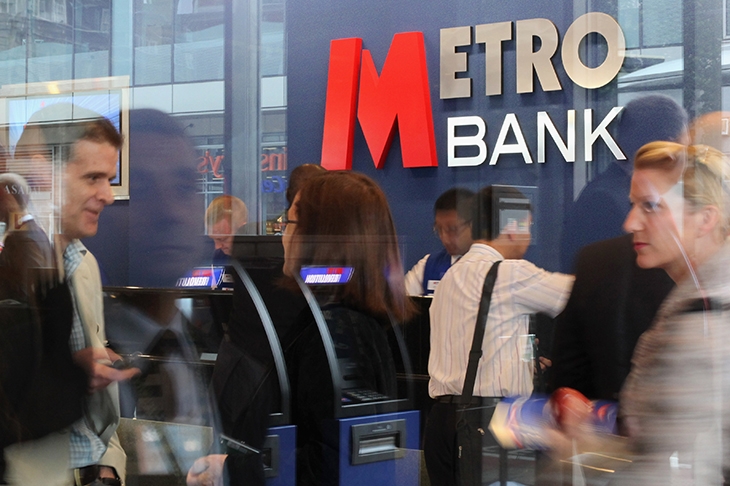This column has long been a fan of the concept of ‘challenger banks’ offering alternatives for personal and small business customers who were mistreated or underserved by the big banks before and after the 2008 crash. Most challengers were internet-based, but Metro Bank — founded in 2010 by US entrepreneur Vernon Hill, whose early career was spent developing sites for McDonald’s — was different. Its model was predicated on an expensive chain of bricks-and–mortar branches (referred to as ‘stores’, open seven days a week, and with 200 planned by 2020) at a time when the likes of NatWest and HSBC were withdrawing from the high street as fast as they could.
All seemed dandy for a while, even as the rate of store openings slowed: there are currently 68. Vernon Hill and his wife Shirley — whose design firm was paid millions for creating the look of the stores — were a bit brash for British tastes but they exuded the optimism our moribund town centres needed. Then came news of an ‘accounting error’ in which £1.7 billion of property-related lendings (in a total loan book of £15 billion) turned out to have been ‘misclassified’, and to need more capital set against them. The bank’s shares plunged from a peak above £40 last year to around £4.80 today. A £350 million capital raising was announced but has yet to be completed, while a proposed injection of £120 million from RBS (under an EU scheme devised to boost the challenger sector in compensation for RBS’s failure to spin-off Williams & Glyn) merely served to irritate Metro’s critics.
Then last week a rogue WhatsApp message warned Metro customers to withdraw their cash and empty their safe deposit boxes, causing what began to look like a run on some of the bank’s west London branches. Metro insisted the rumours were false, and it was certainly irresponsible to suggest, as one Twitter user did, that Metro customers have ‘another Northern Rock on their hands’. But this story is far from over, shareholders who backed the 2016 flotation will feel the pain, and Metro is beginning to look like the wrong model for its place and time.
No oomph for Uber
It’s arguable whether Uber was unlucky or ill-advised to have gone ahead with its flotation in a week when stock markets worldwide were reacting nervously to the worsening state of US-China trade relations. But at $45 per share, the $82 billion IPO valuation for the ride-sharing giant was cautiously less than earlier expectations — and indeed the share price was below what private investors had paid in a fundraising round three years ago.
Still the stock failed to take off, drifting downwards to $37 by Monday night and mirroring the performance of Uber’s smaller rival Lyft, which listed at $72 in late March and now trades around $48. Both companies are heavy loss-makers with slowing revenue growth and no date in prospect for breaking into profit — a description that has not deterred investors from chasing other tech stocks ever upwards in the recent past. But in both these IPOs, the urge to provide private investors with an exit path via a public listing, while generating ample fees for bankers, seems to have overridden the wisdom of waiting for a more opportune moment. It’s all a poor advertisement for capital markets, and hardly surprising retail investors have proved reluctant to share the ride.
Low-hanging fruit
As an avid reader of the Sunday Times Rich List, I traditionally salute the aspirational tail-enders rather than the multibillionaire oligarchs on top. I was sorry to see, for example, that Woon Wing Yip, the Chinese supermarket owner who turned the £10 he arrived with in Birmingham in 1959 into a £115 million fortune and held last position in the list for several years, had failed to make the 2019 cut. But in his place I congratulate the Wainwright jewellery family of Liverpool, makers of Grand National trophies, who alphabetically complete the lowest-ranking £120 million bracket that includes the Earls of Rosebery and Stockton and the veteran property man Elliott Bernerd.
But they had all better watch out, because if there’s one student of this survey more avid than me, it’s sure to be shadow chancellor John McDonnell, who will be totting up potential takings for the punitive wealth tax he plans to impose on day one of an incoming Labour regime. And given that the ultra-wealthy are far more likely to have offshore defences in place than the merely rich, it’s the bottom end of the list that will offer the low-hanging fruit.
Frankly I prefer fish
If I had been a guest on last week’s Any Questions from Cambridge on Radio 4, I would have struggled for a crowd-pleasing answer to ‘What one thing are members of the panel going to change in their own lives in response to the climate emergency?’. I’m no virtue-signaller — and I believe the environmental issues that are suddenly red hot in public consciousness are far more likely to be ameliorated by entrepreneur-driven technologies than by heavy-handed state interventions or spontaneous outbursts of mass self-denial. But I suppose I might have said: ‘I’ll buy an electric car as soon as there’s a network of plug-in stations anywhere near where I live and conclusive evidence that the lifetime carbon footprint of an electric vehicle — taking account of manufacture, the rare minerals required for the batteries, scrap disposal and how the electricity is generated — is smaller than a clean diesel. Meanwhile, I’m always happier travelling by train, so long as there’s one that takes me where I want to go.’
I might have added: ‘Frankly, I prefer fish to red meat anyway’ — but I fear I would have been howled at for showing insufficient urgency and remorse. I’m eager to hear readers’ practical, non-self-flagellating, one-sentence answers to the question, at martin@spectator.co.uk.







Comments